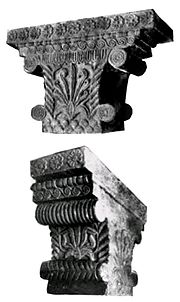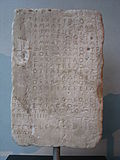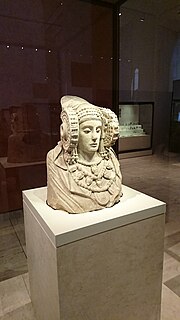the Indo-Greek kingdom and its chronology. Sources related to the Indo-Greeks can be classified into various categories: ancient literary sources from...
41 KB (5,181 words) - 23:58, 24 July 2024
The History of the Indo-Greek Kingdom covers a period from the 2nd century BCE to the beginning of the 1st century CE in northern and northwestern Indian...
51 KB (6,471 words) - 13:31, 22 August 2024
The Indo-Greek Kingdom, also known as the Yavana Kingdom, was a Hellenistic-era Greek kingdom covering various parts of modern-day Afghanistan, Pakistan...
219 KB (25,948 words) - 09:23, 25 October 2024
Indo-Greek art Indo-Greek art is the art of the Indo-Greeks, who reigned from circa 200 BC in areas of Bactria and the Indian subcontinent. Initially,...
86 KB (9,302 words) - 09:48, 18 September 2024
The legacy of the Indo-Greeks starts with the formal end of the Indo-Greek Kingdom from the 1st century, as the Greek communities of central Asia and...
44 KB (5,237 words) - 22:00, 24 June 2024
language was the most recent common ancestor of all Greek dialects. Proto-Greek split off from its nearest Indo-European relatives sometime during the European...
31 KB (3,691 words) - 03:34, 5 August 2024
The Indo-European languages are a language family native to the overwhelming majority of Europe, the Iranian plateau, and the northern Indian subcontinent...
112 KB (10,257 words) - 12:31, 31 October 2024
The Indo-Greeks practiced numerous religions during the time they ruled in the northwestern Indian subcontinent from the 2nd century BCE to the beginning...
38 KB (4,352 words) - 00:10, 3 July 2024
The pre-Greek substrate (or substratum) consists of the unknown pre-Greek languages (either Pre-Indo-European or other Indo-European languages) spoken...
43 KB (4,264 words) - 16:04, 26 October 2024
coinage benefited from the help of Greek coin-makers. Indo-Scythian coins continue Indo-Greek tradition by using the Greek alphabet on the obverse and Kharoshthi...
53 KB (5,855 words) - 05:57, 24 August 2024
Greek (Modern Greek: Ελληνικά, romanized: Elliniká, pronounced [eliniˈka]; Ancient Greek: Ἑλληνική, romanized: Hellēnikḗ) is an Indo-European language...
68 KB (6,904 words) - 04:58, 3 November 2024
The Indo-European migrations are hypothesized migrations of peoples who spoke Proto-Indo-European (PIE) and the derived Indo-European languages, which...
267 KB (29,484 words) - 08:57, 2 November 2024
Indo-Aryan peoples are a diverse collection of peoples speaking Indo-Aryan languages in the Indian subcontinent. Historically, Aryans were the Indo-Iranian...
20 KB (1,594 words) - 14:45, 23 October 2024
characters used to write reconstructed Proto-Indo-European words (for an explanation of the notation, see Proto-Indo-European phonology). Without proper rendering...
63 KB (5,751 words) - 17:24, 1 November 2024
Nicias (Greek: Νικίας, Nikías; r. 90 – 85 BC) was an Indo-Greek king who ruled in the Paropamisade. Most of his relatively few coins have been found in...
4 KB (323 words) - 07:35, 12 October 2024
process of reconstructing Proto-Indo-European myth. Despite the popularity of Greek mythology in western culture, Greek mythology is generally seen as...
140 KB (17,130 words) - 23:38, 31 October 2024
modern term and the source of many surviving Indo-European myths and legends about dragons. The word dragon derives from the Greek δράκων (drakōn) and...
12 KB (1,505 words) - 18:03, 22 October 2024
Hellenic languages (redirect from Greek languages)
is the branch of the Indo-European language family whose principal member is Greek. In most classifications, Hellenic consists of Greek alone, but some...
14 KB (1,249 words) - 10:57, 28 September 2024
conquering territory from the Indo-Scythians and Indo-Greeks, thus transforming his kingdom into an empire. The domains of the Indo-Parthians were greatly reduced...
34 KB (3,472 words) - 04:04, 16 October 2024
originally written in Greek. The Greeks speak the Greek language, which forms its own unique branch within the Indo-European family of languages, the Hellenic...
227 KB (20,527 words) - 09:38, 27 October 2024
The Indo-Aryan migrations were the migrations into the Indian subcontinent of Indo-Aryan peoples, an ethnolinguistic group that spoke Indo-Aryan languages...
236 KB (27,680 words) - 08:57, 2 November 2024
Leukosyroi the Greek name, Leucosyri is the Latin name based on Greek) (Cappadocians also inhabited the West Pontus that originally was part of Cappadocia)...
10 KB (897 words) - 06:51, 3 November 2024
India in Vidisha, by Heliodorus (Greek: Ἡλιόδωρος), a Greek ambassador of the Indo-Greek king Antialcidas to the court of the Shunga king Bhagabhadra. The...
81 KB (8,132 words) - 21:33, 24 October 2024
Ancient Greek (Ἑλληνῐκή, Hellēnikḗ; [hellɛːnikɛ́ː]) includes the forms of the Greek language used in ancient Greece and the ancient world from around...
48 KB (5,244 words) - 19:13, 22 October 2024
equivalent to Mycenean Greek and would date to the 17th century BC, closely associating Greek migration to Greece with the Indo-Aryan migration to India...
54 KB (6,411 words) - 09:32, 18 September 2024
Shunga Empire (category Dynasties of Bengal)
Satavahana dynasty, the Indo-Greek kingdom and possibly the Panchalas and Mitras of Mathura. Art, education, philosophy, and other forms of learning flowered...
53 KB (5,484 words) - 17:39, 21 October 2024
Iberians (redirect from Iberian history)
They are described in Greek and Roman sources (among others, by Hecataeus of Miletus, Avienius, Herodotus and Strabo). Roman sources also use the term Hispani...
31 KB (3,752 words) - 15:38, 20 October 2024
Proto-Greek language (also known as Proto-Hellenic) is the Indo-European language which was the last common ancestor of all varieties of Greek, including...
70 KB (6,787 words) - 05:41, 29 October 2024
Paleo-Balkan languages (category Indo-European languages)
grouping of various Indo-European languages that were spoken in the Balkans and surrounding areas in ancient times. In antiquity, Dacian, Greek, Illyrian...
35 KB (3,822 words) - 22:59, 14 October 2024
Indian Canadians (redirect from History of Indo-Canadians)
policies and ideologies in the 1980s, 'Indo-Canadian' is a term used in mainstream circles of people in Canada as of 2004. In 1962, 'Pakistani' and 'Ceylonese'...
138 KB (12,476 words) - 14:09, 31 October 2024




















